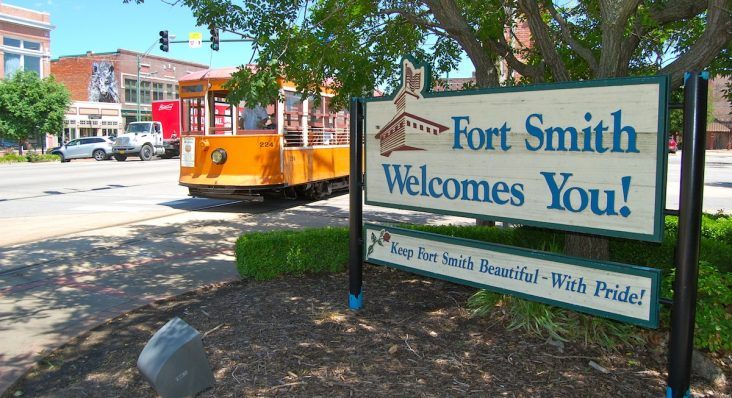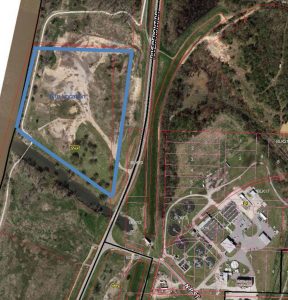CBID approves RV park plan along Arkansas River, reviews downtown assessment plan
by January 19, 2021 2:17 pm 3,085 views

Fort Smith could have a new RV park located near the Arkansas River in 2022. Fort Smith Central Business Improvement District (CBID) commissioners approved a request Tuesday (Jan. 19) by Rick Griffin and Phil White to move forward with an RV Park on Riverfront Drive.
The park will be located just south of 330 acres the city purchased from Kansas City Southern Railroad Company for soft surface trails. Griffin with Griffin Properties in Fort Smith told the commission the proposed park would include 107 paved RV parking spaces, 12 tent spaces, a swimming pool, restroom facilities and a playground. It will have a park-like setting and also will include a manager residence that will have an apartment, office and retail space.
Developers also hope to add a boat ramp that will allow access to the Arkansas River. Doing so will require Arkansas Corps of Engineers’ approval, Griffin said. He added that because the ramp would be a backwater entry rather than direct entry into the Arkansas River, he hoped it would receive approval.
The 27-acre park will cost about $2.5 million to develop, he said, noting they already own the land. The property is bordered to the north by the city’s land which is being developed for biking, running and hiking trails to the north and the Arkansas River to the south.
“We hope to incorporate some good views to the river and views to the trails for hiking and biking,” Griffin said during the CBID’s regular meeting held Tuesday morning, adding they hope to have access from the park to the trails.

The property is within the CBID and zoned a Planned Zoning District (PZD) that permits camps, camping and related establishments, said a memo from Brenda Andrews, senior planner for the city. The next step in the process is for Griffin and White to obtain all necessary city approvals.
Griffin said planning will take about three months to be complete and construction should take about nine months, making the park ready to open around the first of next year.
“We think it’s going to be a great benefit for the city. People drive their RVs up to the (Fort Smith) National Historic Site, get out and go tour. Then get back in their RV and drive off. We think the RV park will be a contributor to the economic development of downtown and Fort Smith,” Griffin said.
ASSESSMENT PLAN
CBID commissioners also on Tuesday reviewed a draft of a petition to the Fort Smith Board of Directors to levy a supplemental annual assessment on property in the CBID for operation, maintenance and repair and replacement of improvements within the CBID.
The CBID approved a resolution in November that could lead to 6 mil assessment on property in the district that could fund a “Safety and Security” program for the downtown district. According to state law, there are two types of assessments that can be levied against real property inside a city’s improvement district – a project/improvement-specific assessment, levied to fund a “specific ‘plan of improvement,’” or a supplemental annual assessment to be used for ongoing operations or maintenance activities, Deputy City Administrator Jeff Dingman said in in August 2019, when the board voted to pursue an assessment on downtown business. At the time Bill Hanna, CBID board chair, said the Fort Smith CBID is one of the few in the state not funded by an assessment.
The CBID commission plans to use monies garnered from an assessment to fund an ambassador program that would hire off-duty police officers as part of a Safety and Security program for downtown. That program would cost about $136,000 annually, according to a proposed operating budget.
The assessment would also fund a Green and Clean project that would include streetscape maintenance and landscaping, which could incorporate care of flowerbeds as well as pruning and possible replacement of trees, cleaning and repairs to benches, lighting and trash receptacles, litter control, conversion of lights along Garrison Avenue to LED and more. The CBID would need about $300,000 to fund both programs, Dingman said.
Based on property valuations in 2019, each 1-mil assessment on properties within the CBID would amount to $38,834.47 in annual operating revenue. However, that estimate did not take into account any property owned by not for profit agencies or local, state or federal government. There are 470 individual parcels in the CBID. Of those, 115 are tax-exempt and have no value assigned to them. These include properties owned by governments, non-profits, churches, etc., according to information provided by the CBID.
In 2019, the CBID hired Total Assessment Solutions (TAS), Sebastian County’s contracted third-party appraisal partner, to assess those properties. Looking at the total appraised property, each 1-mil assessment on all properties within the CBID would amount to approximately $61,000. However, some of those properties would be exempt from the assessment. While government properties would continue to be exempt from the assessment, not for profit entities would not be, said Michelle Allgood, the attorney working with the CBID on the assessment question.
Before an assessment can be levied, more than 50% of property owners in the district must sign a petition agreeing to an assessment. The CBID board of directors would then present that petition and the plan to the Fort Smith City Board of Directors. Dingman said under the state law if the CBID has the required signatures on the petition, the city’s BOD would be compelled to approve the assessment as an ordinance.
The draft petition Allgood presented to commissioners Tuesday states the annual assessment will not “exceed 10 mills assessed upon the real property within the boundaries of the CVID.” Commissioners voted in November to look at the assessment each year to determine what actual amount would be needed. In the beginning, they say, 6 mills should be enough.
Allgood said there were still some questions she needs to research before commissioners begin collecting signatures on the petition. She said she thinks she will have it ready for them in “a couple of weeks.” The assessment will not be able to be levied in 2021. The earliest the CBID could receive funds would be in 2022, she said.
CBID COMMISSION CHANGES
In other business at the meeting, Richard Griffin resigned his position on the CBID. Griffin served on the board for 25 years, the longest of any commissioner.
“Richard is the kind of person who has led with his activities and actions. He has a passion for downtown. He and Rick have both committed and you see their fingerprints all over downtown. Without your sort of leading, we probably wouldn’t have the kind of commitment we have from other commissioners and people downtown. Your investments downtown have paved the way for other investments downtown,” Hanna said. “I’m going to miss your presence on this side of the table, but you do not need to stay away from this meeting. You need to make sure that you come and be on that side of that table, and you can be just as effective a part of the CBID over there as you have been here.”
CBID Commissioner Rodney Ghan resigned from the board at the end of 2020. The Fort Smith Board will consider filling that open position at Tuesday night’s regular meeting. Griffin’s position will have to be posted and advertised, and the board will fill it at a later date, Dingman said.
